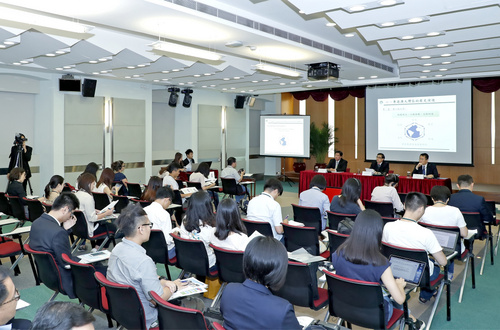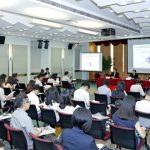 The press conference on a public consultation regarding Macao’s participation in the plan for a city cluster in the Guangdong-Hong Kong-Macao Greater Bay Area.
The press conference on a public consultation regarding Macao’s participation in the plan for a city cluster in the Guangdong-Hong Kong-Macao Greater Bay Area.
The Government has launched a public consultation regarding Macao’s participation in the plan for a city cluster in the Guangdong-Hong Kong-Macao Greater Bay Area starting from today.
The consultation period, which runs until 28 June, seeks to garner social consensus regarding the development plan laid down by Premier of the State Council, Mr Li Keqiang, in his latest work report.
The news on the consultation process was announced today by Adviser to the Chief Executive’s Office, Mr Kou Chin Hung; the Director of the Policy Research Office, Mr Lao Pun Lap; and the Government Spokesperson, Mr Chan Chi Ping.
After several in-depth pieces of research, the Government had proposed Macao’s participation in the Greater Bay Area could cover two roles, three positions and eight highlighted aspects of work, said Mr Kou.
The two roles, respectively, were Macao’s use of its function under the “One country, two systems” principle and the city’s efforts in contributing to the Silk Road Economic Belt and the 21st-Century Maritime Silk Road, (collectively known as the “Belt and Road” initiative).
The three positions referred to Macao’s strategic positioning as a world centre of tourism and leisure and as a commercial and trade cooperation service platform between China and Portuguese-speaking countries (collectively known as “Centre and Platform” policies); together with the city’s role as a proposed hub for exchanges and cooperation on Chinese culture via Macao’s environment of multicultural coexistence.
The eight highlighted aspects of work for Macao were: to extend the city’s platform role to cover the Greater Bay Area; to push forward the city’s moderate economic diversification; to enhance social well-being in the city; to encourage further people-to-people exchanges; to boost bilateral cooperation; to advance infrastructure connectivity; to support innovative development in Macao; and to strengthen promotion of the Greater Bay Area.
The Greater Bay Area is to encompass the efforts of two Special Administrative Regions (SARs), namely Hong Kong and Macao; and nine cities from Guangdong Province, namely Guangzhou, Shenzhen, Zhuhai, Foshan, Huizhou, Dongguan, Zhongshan, Jiangmen and Zhaoqing. All the places can thus contribute to the development prospects of the Pan-Pearl River Delta Region.
Advancing and integrating development in the Greater Bay Area – particularly in relation to economic matters and trade; social welfare; cultural affairs and education; infrastructure construction; environmental protection; and inspection and quarantine procedures – would facilitate Macao’s economic diversification and enhance overall social well-being, stated Mr Kou.
The Government observed the principle of “serving the country’s needs, delivering Macao’s strengths” in pressing ahead with its efforts to advance development of the Greater Bay Area. In doing so, Macao would give full play to the city’s distinctive advantages, elevating its roles in China's economic development and opening up, added Mr Kou.
The Government is to compile an official document on how Macao might participate in the development of a city cluster in the Guangdong-Hong Kong-Macao Greater Bay Area and submit it to the Central Government, together with an analysis of opinions gathered from the consultation and research conducted previously.
Members of the public are welcome to contribute their opinions on or before 28 June. They can do so via a dedicated website of the Chief Executive’s Office (https://www.gce.gov.mo/bayarea); or by email to: event@gep.gov.mo; or by telephone on +853 2883 9919; or by fax to +853 2882 3426; or in person (by prior appointment only) to representatives of the Policy Research Office at Rua do Desporto, No.185-195, Taipa, Macao.


